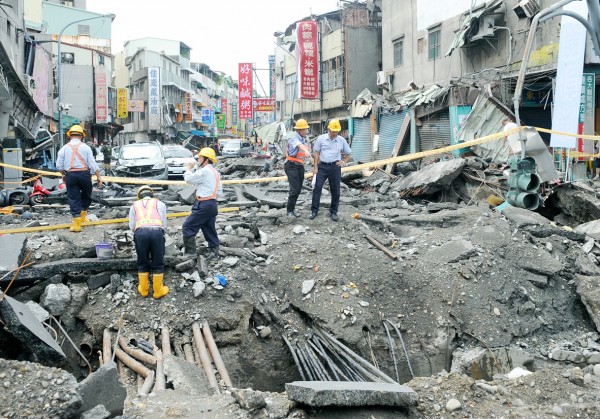《TAIPEI TIMES 焦點》 Release pipeline data: academic

Workers yesterday clean up near exposed pipes in Greater Kaohsiung, which was devastated by a series of explosions on Thursday night and early Friday. Photo: Wang Min-wei, Taipei Times
By Meng Ching-tzu and Jason Pan / Staff reporter, with staff writer
Experts have called for the government to install a comprehensive pipeline monitoring system to avoid a repetition of the gas explosions that took place in Greater Kaohsiung on Thursday night and early Friday morning, causing at least 28 deaths and leaving 286 people injured.
Petrochemical companies have vast networks of underground pipelines in Kaohsiung, said Chen Chih-yung (陳志勇), professor of chemical engineering at National Cheng Kung University.
“To prevent such a tragedy from recurring, we must have transparency. People have the right to know the real information,” said Chen, who also serves on the board of CPC Corp, Taiwan (CPC, 台灣中油) as an independent director.
“The government should inform the public where the petrochemical pipelines are buried, then a monitoring system must be installed for the entire petrochemical pipeline network in the city. Also, the government must establish standard operating procedures for emergency responses,” he said.
Chen said the most important thing now is for the government to calm public fears.
“Of course, we must find out who is responsible for the gas explosions, but that is not the priority at this time,” he said. “The first thing to do is to tell the public where the pipelines are laid and where there are no pipelines. Like when an earthquake strikes, information on the epicenter is reported on the news, so people can be alert.”
However, Chen said he knows that if maps of underground pipelines were published, they might affect real-estate prices.
“However, people have the right to know. To understand a situation better can help in prevention. It’s not knowing what and where [the pipelines are] that is most frightening to people,” Chen said.
“CPC is the top boss of Taiwan’s petrochemical industry, so it should be the first to come out and make a comprehensive examination of all the old and aging pipelines,” he added, saying that all petrochemical companies have installed pressure gauges at both ends of pipelines, which help to detect leaks.
However, he said he was not sure whether there are pressure gauges throughout other sections of pipe and added that there are other engineering methods to check on leaks.
“For example, in culvert pipes, monitoring devices are installed at regular intervals. It costs more money to install such systems and there are other factors considered. So we are not sure whether Taiwan’s petrochemical companies have done so,” Chen said.
新聞來源:TAIPEI TIMES




















